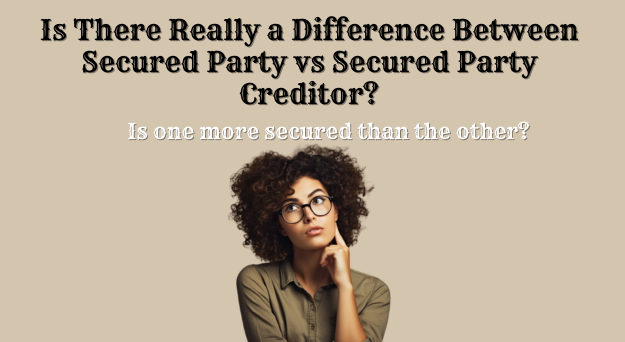There’s a lot of debate about the common source of confusion surrounding the terms ‘secured party creditor’ and ‘secured party’, and how the words ‘secured party creditor’ does not exist in the Uniform Commercial Code (UCC) written together that is. Many will dispute that the words ‘secured party creditor’ are invalid and don’t equate to anything.
In this blog post, we aim to bring clarity and awareness around these terms once and for all.
It is important to note that while you will not find the exact term “secured party creditor” in the UCC, the discussion around it often revolves around a play on words and interpretations.
First, let’s look at what is a secured party?
“Secured party” means a lender, seller or other person in whose favor there is a security interest, including a person to whom accounts or chattel paper have been sold. When the holders of obligations issued under an indenture of trust, equipment trust agreement or the like are represented by a trustee or other person, the representative is the secured party. See UCC 9-105.
The term “secured party” also refers to any of the following individuals or entities:
- A person who has a security interest established or provided for in a security agreement, regardless of whether any outstanding obligation is being secured.
- A person holding an agricultural lien.
- A consignor.
- A person who has acquired accounts, chattel paper, payment intangibles, or promissory notes through sale.
- A trustee, indenture trustee, agent, collateral agent, or any other representative who has a security interest or agricultural lien established or provided for in their favor.
- A person who holds a security interest that arises from Section 2401, 2505, 4210, or 5118, or under subdivision (3) of Section 2711 or subdivision (5) of Section 10508.
According to the Uniform Commercial Code (UCC) 9-102(a)(72), a secured party is a person or business that possesses a legal right to specific money and/or goods that belong to another individual or entity.
The Uniform Commercial Code is a set of laws governing commercial transactions in the United States. You can refer to Article 9 of the UCC, which deals with secured transactions, including the definition of a secured party.
Now, let’s define the word ‘Creditor’.
According to Black’s Law Dictionary 4th Edition, the word ‘creditor’ means a term of universal application to obligation due and to become due. A term used in taxation statutes to designate certain forms of personal property. It includes every claim and demand for money and certain sum of money receivable at stated periods, due or to become due, but not accrued rents to issue out of land.
Creditor under UCC § 1-201. General Definitions is defined as:
Creditor includes a general creditor, a secured creditor, a lien creditor, and any representative of creditors, including an assignee for the benefit of creditors, a trustee in bankruptcy, a receiver in equity, and an executor or administrator of an insolvent debtor’s or assignor’s estate.
What does ‘party’ mean?
So, can one really be a secured party creditor?
While the term may sound redundant or contradictory at first glance, it is possible for a man or woman to be both a secured party and a creditor in certain legal contexts.
Under the Uniform Commercial Code (UCC) and other legal frameworks, a “secured party” refers to an individual or entity that holds a security interest in collateral to secure a debt or obligation. This security interest provides the secured party with certain rights and remedies if the debtor defaults on the debt.
A “creditor,” on the other hand, is a person or entity to whom a debt is owed. Creditors can be either secured or unsecured, depending on whether they hold a security interest in the debtor’s property.
In some situations, a secured party may also be a creditor if they are owed a debt by the debtor.
While the term “secured party creditor” may not be used extensively or formally in legal language, it is possible for these two roles to coexist in certain circumstances. The specific context and legal framework in which the term is used would determine whether it is appropriate or applicable.








Leave A Comment